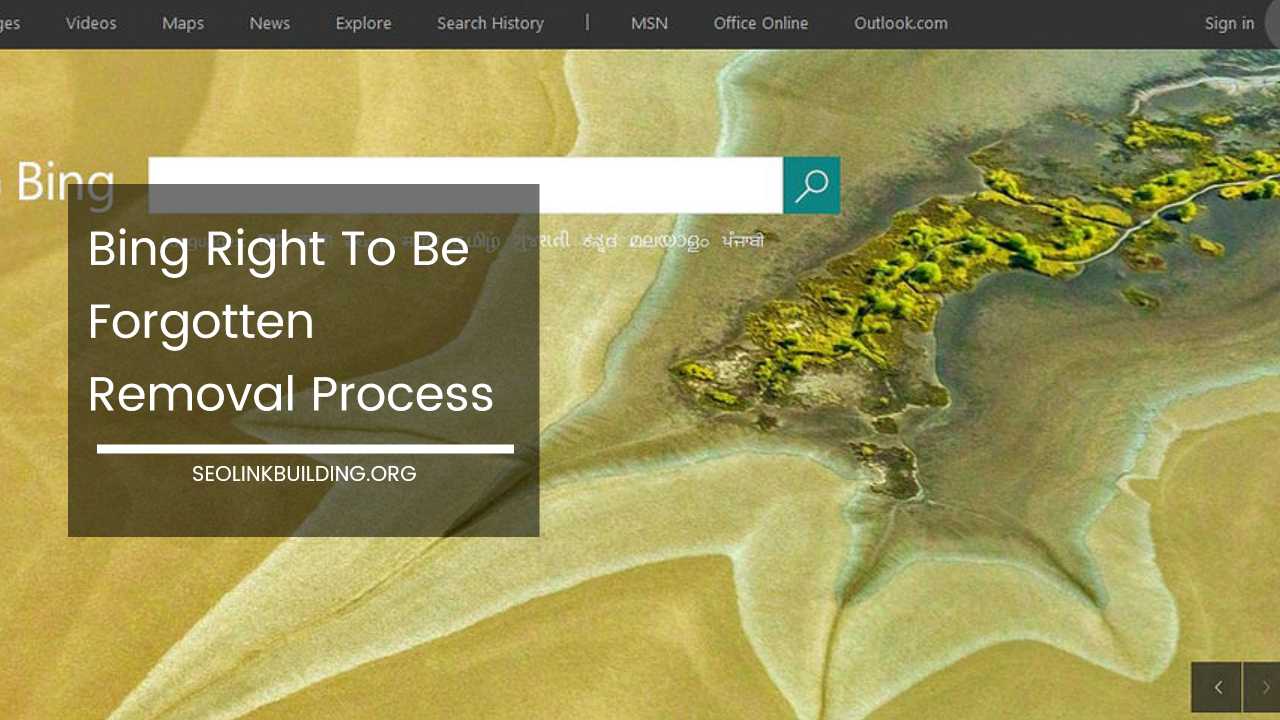Bing Right to Be Forgotten Removal Process

Taking Control of Your Digital Footprint: A Comprehensive Guide to Bing’s Right to Be Forgotten Removal Process
The internet has revolutionized communication and information access, but it also creates a permanent record of our lives.
While this can be beneficial for professional opportunities and maintaining connections, it can also lead to the persistence of unwanted information in search results.
The European Union’s (EU) General Data Protection Regulation (GDPR) grants individuals the “Right to be Forgotten,” empowering them to take control of their online identity.
This right allows EU residents to request search engines like Bing to delist links containing inaccurate, outdated, or irrelevant personal information.
This comprehensive guide delves into the intricacies of Bing’s Right to be Forgotten removal process, equipping you with the knowledge to manage your online presence effectively.
We’ll explore the legal basis for this right, eligibility criteria, the intricacies of the removal process itself, and factors Bing considers during evaluation.
Additionally, we’ll discuss best practices for crafting a compelling request, potential challenges you might face, and alternative strategies for online reputation management.
The Right to be Forgotten: Legal Basis and Core Principles
The Right to be Forgotten is enshrined in the GDPR, a landmark piece of EU legislation that regulates how personal data is collected, used, and stored by organizations.
This right is grounded in the fundamental right to privacy, granting individuals control over their personal information and the ability to determine how it’s disseminated online.
The core principles behind the Right to be Forgotten are:
- Transparency: Individuals have the right to be informed about how their personal data is being collected, used, and stored.
- Control: Individuals have the right to access, rectify, or erase their personal data.
- Accountability: Organizations are responsible for ensuring the lawful processing of personal data and must comply with data subject requests.
When Does the Right to be Forgotten Apply?
The Right to be Forgotten is not a blanket right to erase any and all information about yourself from the internet. It applies in specific situations where the continued presence of personal information in search results is deemed:
- Inaccurate or Misleading: You have the right to request delisting of links containing demonstrably false or misleading information about you. This could include outdated financial information, incorrect birthdates, or inaccurate criminal records.
- Outdated or No Longer Relevant: Information that is no longer relevant or reflects a situation from your distant past can be delisted. For example, an arrest record expunged by the court should not appear in search results.
- Excessive or Unduly Harmful: Links to content that is excessively private, embarrassing, or detrimental to your reputation can be delisted. This could include childhood photos you’d rather not be publicly available, outdated news articles about a resolved financial issue, or revenge porn.
Important Considerations Before Submitting a Request
Before submitting a Right to be Forgotten request to Bing, it’s crucial to understand some key points:
- EU Residency: The Right to be Forgotten currently applies to residents of the European Union or countries with similar data protection laws.
- Information Scope: The information you wish to delist must appear in search results for your name. Bing cannot remove information directly from the source website itself.
- Balancing Act: Bing must balance your privacy rights with the public interest in accessing information. This means not all requests will be successful, especially for information deemed newsworthy or of public record.
The Right to be Forgotten Removal Process on Bing: A Step-by-Step Guide
Bing provides a dedicated web form for submitting Right to be Forgotten requests: [invalid URL removed] forgotten-removal-requests-report. Here’s a detailed breakdown of the steps involved:
-
Gather Information:
- Compile a list of specific URLs you wish to be delisted. Prioritize URLs containing the most sensitive or harmful information.
- Gather screenshots or search queries that demonstrate how this information appears in search results. This helps Bing understand the context of your request.
-
Complete the Request Form:
- Carefully fill out the Bing Right to be Forgotten request form.
- Provide a clear and concise explanation for why you believe the information should be delisted, referencing the criteria mentioned earlier (inaccurate, outdated, or causing undue harm).
- Explain how the continued presence of this information negatively impacts your privacy and well-being. Be specific and provide examples if possible.
-
Supporting Documentation:
- Attach any relevant documentation that strengthens your case. This could include:
- Court orders proving the information’s inaccuracy (e.g., expunged criminal records).
- Proof of identity theft for situations where your personal information is being misused.
- Verifiable evidence demonstrating the information’s outdated nature (e.g., outdated financial information).
- Medical records (with appropriate redactions) to substantiate the emotional distress caused by the information.
- News articles or reports providing context for why the information is no longer relevant (e.g., resolved financial issues).
-
Submit and Wait:
- Once you’ve completed the form and attached any necessary documentation, submit your request.
- Bing will review your case and respond within one month.
Important Considerations After Submitting Your Request
- Timeline: Allow Bing a reasonable timeframe (one month) to evaluate your request. Complex cases involving extensive information or legal considerations may require additional time.
- Rejections and Appeals: If your request is rejected, Bing will provide an explanation in their response. You have the right to appeal the decision by providing further information or clarification. Be sure to address the reasons for rejection in your appeal and provide any additional supporting evidence you may have gathered.
- Limited Scope: Remember, the Right to be Forgotten only applies to search results. Bing will delist the links from their search engine, but it doesn’t guarantee the removal of the information itself from the source website. You may need to contact the website owner directly to request removal from their platform. In some cases, depending on the nature of the information, legal action may be necessary.
Best Practices for Crafting a Compelling Right to be Forgotten Request
- Clarity and Conciseness: Clearly state the URLs you wish to be delisted and provide a concise explanation for your request.
- Focus on Specific Criteria: Align your arguments with the established criteria for delisting (inaccurate, outdated, or causing undue harm). Provide specific examples and evidence to support your claims.
- Professional Tone: Maintain a professional and respectful tone throughout your request. Avoid accusatory language or emotional outbursts.
- Prioritize the Most Damaging Information: Focus on delisting the URLs containing the most sensitive or harmful information first.
Potential Challenges and Strategies for Overcoming Them
- Balancing Act: As mentioned earlier, Bing must balance your privacy rights with the public interest. Information deemed newsworthy or of public record (e.g., government records, criminal convictions) might be more difficult to remove. For such cases, consider focusing on arguments related to the information’s irrelevance or the passage of time, demonstrating how it no longer serves a public interest.
- Outdated Information on Third-Party Sites: Bing can only delist information from its own search results. If the information resides on a third-party website, you may need to contact the website owner directly to request removal. In some cases, utilizing content removal procedures offered by the platform itself might be an option.
- Complex Legal Issues: For situations involving sensitive legal matters like revenge porn or identity theft, consider seeking legal counsel to explore your options and craft a more robust request.
Alternative Strategies for Online Reputation Management
While the Right to be Forgotten is a valuable tool, it’s not the only approach to online reputation management. Here are some complementary strategies:
- Search Engine Optimization (SEO): Implement SEO strategies to promote positive content about yourself that will appear higher in search results, pushing down negative information.
- Content Creation: Create and publish positive content about yourself on your own website or social media profiles.
- Online Reputation Management Services: Consider professional online reputation management services that can help develop and implement a comprehensive strategy to improve your online image.
Final Thoughts
The Right to be Forgotten empowers EU residents to reclaim control over their online presence and remove inaccurate, outdated, or irrelevant personal information from Bing search results.
By understanding the legal basis, eligibility criteria, and the removal process itself, you can increase your chances of a successful request.
Remember, this process is not a guarantee, but it offers a powerful tool for managing your online reputation within the framework of the GDPR.
Additional Resources
- Microsoft Bing Transparency Report: https://www.microsoft.com/en-us/corporate-responsibility/government-content-removal-requests-report
- European Commission – General Data Protection Regulation (GDPR): https://commission.europa.eu/law/law-topic/data-protection_en
This comprehensive guide equips you with the knowledge and strategies to navigate the intricacies of Bing’s Right to be Forgotten removal process.
By following these steps and considering alternative online reputation management techniques, you can take control of your online identity and shape a more positive digital footprint.













